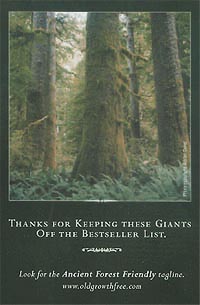- Categories:
Green Press Initiative: It's Better Being Green
You still may not be able to judge a book by its cover, but you can discover certain things about a publisher's priorities and philosophy regarding the environment and conservation by checking the contents of a book's paper stock. Over the past few years, environmentalists, publishers, paper mills, authors, and printers -- both in Canada and the U.S. -- have attempted to mitigate the damaging environmental impact of book publishing and to raise the environmental standards without diminishing the quality of the books.
 One organization that is successfully raising awareness of this environmental issue in the U.S. and Canada is the nonprofit Green Press Initiative (GPI), whose mission is to work with publishers, industry stakeholders, and authors to create paper-use transformations that will conserve natural resources and preserve endangered forests.
One organization that is successfully raising awareness of this environmental issue in the U.S. and Canada is the nonprofit Green Press Initiative (GPI), whose mission is to work with publishers, industry stakeholders, and authors to create paper-use transformations that will conserve natural resources and preserve endangered forests.
Book publishers are enormous consumers of paper -- the U.S. book market accounts for five to seven percent of the printing and writing paper market. Paper shipments to U.S. publishers each year average one million tons, which consumes 20 to 30 million trees. These numbers are calculated and publicized by organizing groups including GPI in the U.S. and Markets Initiative in Canada.
Their efforts have resulted in significant innovations within the publishing industry. In 2003, Raincoast Books of Canada printed over one million copies of Harry Potter and the Order of the Phoenix for the Canadian market on 100 percent Endangered Forest Free paper, for which it received international media attention and awards.
According to Tyson Miller, founder and program director of GPI, a confirmed count of 10 million books are published in the U.S. on Endangered Forest Free paper. "This number does not include books published in Canada or published in the U.S. by publishers who don't participate with GPI," he told BTW, "A lot has happened in the publishing industry in the past four years."
Most recently, Powells.com, the large online independent bookseller, has announced its creation of a "green aisle" to include those titles that follow the environmentally sensitive paper-use guidelines established by GPI.
Georgie Lewis, publisher liaison at Powells.com, told BTW that, beginning on Earth Day, April 21, "Powell's wants to give special recognition to publishers who are taking this environmental initiative and to educate readers about the value of books printed on these environmentally friendly papers." The titles will be identified on the website's product pages and again in a separate section that explains the benefits of books printed environmental papers.
To date, 60 U.S. publishers have pledged to eliminate their use of Endangered Forest paper and to make production innovations so that within three to five years, all titles are on paper that is at least 30 to 100 percent post-consumer recycled paper, and the remaining fiber content will satisfy the GPI guidelines.
Over 10 U.S. printers now stock book papers with recycled and/or Forest Stewardship Council (FSC) certified pulp. Fourteen new book papers have come to market within the last three to four years as a result of work by GPI and Markets Initiative.
Emiko Morita, manager of Raincoast Book's U.S. sales and marketing, is an enthusiastic ambassador of the environmental advances in publishing, particularly at Raincoast, where 95 percent of its books are now published on 100 percent post consumer Endangered Forest Free recycled paper.
"We're committed to protecting the environment in all ways possible," Morita said. "A number of our books focus on environmental issues -- recently, Chasing Clayoquot: A Wilderness Almanac by David Pitt-Brooke and Devil and the Disappearing Sea by Rob Ferguson."
Morita noted some impressive statistics -- as of November 2004, Raincoast Books has left 75,185 trees standing -- enough to fill an area equivalent to 3.5 times New York's Central Park. Those trees would have been cut down had Raincoast printed books on virgin paper. It has saved 32,470,691 gallons of water; 37,817 million BTUs of energy -- equivalent to 6,940 years of electricity to power the average North American home; and Morita's favorite -- 4,070,279 pounds of solid waste or the equivalent of 453 average female elephants.
Miller sees a cause for optimism in convincing more publishers to turn to "green" paper for books. He also considers booksellers a valuable link in the green press movement, "Supplying environmentally-conscious readers with more options ['green' sections, support of 'green' publishers] can only help to solidify the relationship the bookseller has with the customer.
"Booksellers committed to conservation," Miller continued," can also provide great incentives for publishers to do the right [environmental] thing."
For information about the Green Press Initiative, including lists of GPI participating publishers, Printers, and Suppliers, go to www.greenpressinitiative.org. -- Nomi Schwartz



